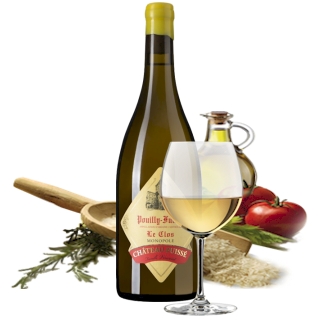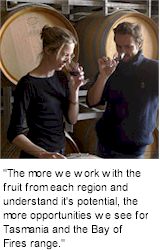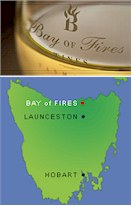


The group winemaking team at Hardys identified, back in 1994, the regions they believed would make cool climate wines of classical structure, combining fruit intensity with refinement, complexity and persistence of flavour - the ultimate expression and grape and region. Tasmania's potential for the production of classic, cool climate grape varieties was clearly evident. Their vision has come to fruition with the success of Bay of Fires, Tigress and Arras.

Tasmania's latitude and island status confer a range of unique climates more closely resembling the classic winegrowing regions of France than any other part of Australia. The vineyards growing grapes for Bay of Fires wines experience growing season temperatures ranging from below those of Reims in Champagne to slightly above those of Burgundy and Alsace. Strong similarities in sunshine hours and humidity also contribute to Tasmania's suitability for growing the world's classic cool climate grape varieties.
Within the range of suitable climates, of particular interest is the strong correlation between specific locations in Tasmania and those of Europe making the world's benchmark examples of Chardonnay, Pinot Noir, Riesling, Sauvignon Blanc and Pinot Gris. In carefully selected sites, Tasmania's cool climate supports balanced vine growth and the production of physiologically mature grapes - grapes exhibiting ripe fruit flavours with soft natural acidity and moderate potential alcohol.
Sparkling wine made from grapes grown in the extremes of Tasmania's cool climate increasingly impress with their finesse, minerally complexity and persistence of flavour. The wines exhibit a steely leanness, which is finely balanced by intensity of fruit flavour. The Bay of Fires sparkling wines are fine examples of this and are at the forefront of quality Australian.

Bay of Fires, Tigress and Arras have evolved from Tasmania's unique vineyards. Moderate yields and cool growing conditions result in wines with outstanding varietal intensity, elevated fruit spice and mineral complexity. The fruit characters of these wines are tight and enduring and support minimal winemaking intervention. Softness of acidity and persistence of flavour are common attributes. These wines are very much an expression of the grapes, soil and climate that produced them.
Bay of Fires wines reflect the courage and care of a dedicated group of Tasmanian winegrowers and the vision and spirit of the winemaking team.
Fran Austin was appointed to Bay of Fires as Winemaker manager to oversee the development of Bay of Fires and Tigress. "The opportunity to work with one of the best and most interesting fruit resources in the country, coupled with the chance to work with the dedicated winemaking team utilising their knowledge and understanding of the region, is exciting."
